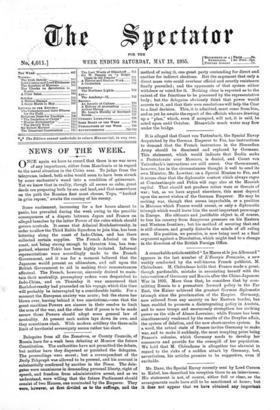Some excitement, increasing for a few hours almost to panic,
has prevailed during the week owing to the possible consequences of a dispute between Japan and France on alleged breaches by the latter Power of the rules which should govern neutrals. It seems that Admiral Rozhdestvensky, in order to allow the Third Baltic Squadron to join him, has been loitering along the coast of Indo-China, and has there collected certain supplies. The French Admiral on the coast, not 'being strong enough to threaten him, has tem- porised, whereat Tokio has been highly irritated. Informal representations were accordingly made to the French Government, and it was for a moment believed that the Japanese would present an ultimatum, and call upon the British Government to aid in making their remonstrances effectual. The French, however, sincerely desired to main- tain their neutrality, peremptory orders were despatched to Indo-China, and on Thursday it was announced that Rozhdestvensky had proceeded on his voyage, which this time will probably be interrupted by a considerable battle. For a moment the European anxiety was acute ; but the storm has blown over, leaving behind it two convictions,—one that the great maritime Powers are sincere in their resolve to limit the area of the war, and the other that if peace is to be made secure those Powers should adopt some general law of neutrality. At present each nation lays down its own, and they sometimes clash. With modern artillery the three-mile limit of territorial sovereignty seems rather too short.






































